Recap: Conference on Market-Based Solutions for Reducing Wealth Inequality

The Kenan Institute and UNC Kenan-Flagler Business School’s second annual Conference on Market-Based Solutions for Reducing Wealth Inequality convened academic economists, finance professionals, policymakers, and local civic leaders and government officials from April 25 – 26 in Chapel Hill, N.C., to present and discuss recent research and developments on the conference’s theme. Researchers presented new work delving into key questions pertaining to wealth inequality, including papers on bank lending practices, minority credit, institutional home-ownership, and the observed effects of Federal banking policy.
Featuring a broad and diverse array of perspectives, the conference was more than an academic convention. Following a lunchtime briefing, participants ventured into the field, traveling to nearby Chatham County, N.C., to see, listen and learn about the area’s history and the county’s present, meteoric rise as a destination for industry plants and mixed-use development. The field trip included tours of new and revitalized facilities as well as discussion panels of community leaders from local developers, businesses, community colleges, and political offices. The panelists discussed multi-dimensional strategies needed to nurture a homegrown talent pool and foster sustained, equitable growth amidst the ongoing flurry of investment in the largely rural county.
Below we briefly recap the academic papers presented, the field trip’s activities, and the expert panels and presentations that punctuated a memorable two days. To access the papers and view the full agenda, please visit the conference website.
Session I: Racial Discrimination in Lending Outcomes

Following opening remarks from Camelia Kuhnen – the conference organizer, Professor of Finance and Sarah Graham Kenan Distinguished Scholar at UNC’s Kenan-Flagler Business School as well as the Kenan Institute of Private Enterprise’s Director of Research, and NCGrowth’s Faculty Director – Matteo Crosignani, a Financial Advisor with the Federal Reserve Bank of New York presented “Stakeholders’ Aversion to Inequality and Bank Lending to Minorities,” which he co-authored with Han Le, Assistant Professor of Finance at University of Illinois Chicago. The paper, published in Federal Reserve Bank of New York Staff Reports in November 2023, shows that some banks tend to lend to minorities more than others and that their propensity to do so is associated with their stakeholder’s aversion to inequality.
Following each author’s presentations of their study’s findings, an expert discussant then examined and critiqued the paper, providing valuable context and feedback on the research paper. Erik Mayer, Assistant Professor of Finance at University of Wisconsin-Madison, was the discussant for Crosignani and Le’s paper, bringing to bear domain expertise on the topics of financial institutions, household finance, and economic mobility.
Next, Agustin Hurtado, Assistant Professor of Finance at University of Maryland, presented his working paper, “The Effect of Minority Bank Ownership on Minority Credit,” co-authored with Jung Sakong, an Economist with the Federal Reserve Bank of Chicago. Lu Liu, Assistant Professor of Finance at University of Pennsylvania Wharton, served as discussant, dissecting the paper’s findings – chief among which showing that mortgage applicants within a particular racial minority group are more likely to have their loan approved if the bank is owned by a member of the same minority group – and suggesting ways the researchers could strengthen their study.
Session II: Homeownership and Wealth Inequality
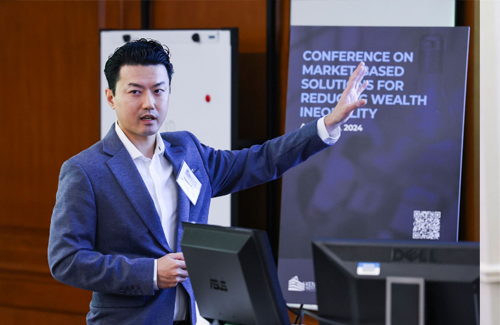
After a short break, Franklin Qian, Assistant Professor of Finance at UNC’s Kenan-Flagler Business School, presented his working paper, “Impact of Institutional Owners on Housing Markets,” co-authored with Caitlin Gorback, Assistant Professor at Texas McCombs School of Business, and Zipei Zhu, PhD Candidate at UNC’s Kenan-Flagler Business School. The study provides precise estimates for the increase in local house prices attributable to the entry of Long Term Rental (LTR) companies into an area’s housing market. The discussant, Michael Reher, Assistant Professor of Finance at University of California San Diego’s Rady School of Managment, lent his expertise on intermediary and household finance to provide insightful analysis of the study and feedback for the authors.
Scott Wentland, Senior Research Economist with the U.S. Department of Commerce’s Bureau of Economic Analysis, then presented the working paper, “Returns to Homeownership and Inequality: Evidence from the First-Time Homebuyer Tax Credit,” co-authored with Marina Gindelsky, Research Economist with the U.S. Bureau of Economic Analysis, Kelly Wentland, Assistant Professor of Accounting at George Mason University, and Jeremy Moulton, UNC Chapel Hill Associate Professor of Public Policy. Their study found that the First-Time Homebuyer Tax Credit (FHTC), helped Black homeowners to garner higher returns on their home investment, suggesting that capital is especially constraining for minority households in building wealth through homeownership. The discussant, Sanket Korgaonkar, Assistant Professor of Commerce at University of Virginia, drew from his expertise on capital markets, labor markets, and regulation’s effects on housing and household credit markets in the United States to analyze the research paper and provide feedback to its authors.
Field trip to Chatham County, N.C.
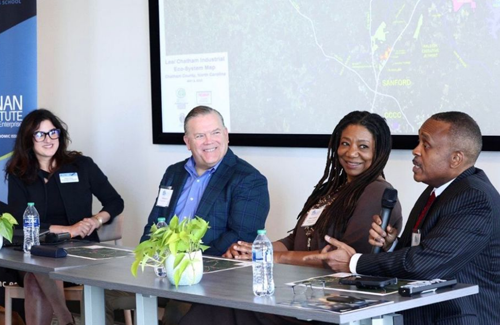
Over lunch, Greg Brown, UNC Kenan-Flagler Business School’s Professor of Finance and the Institute for Private Capital’s Founder and Research Director, briefed conference participants on Chatham County, N.C.’s history and local economy. Then everyone piled into a hired bus for a half-hour ride to the 79°West Innovation Hub, a new “co-warehousing workspace” with more than 30,000 square feet of multi-use space housed within MOSAIC, a 44-acre mixed-use community, just north of downtown Pittsboro, N.C.
Conference-goers gathered there for a panel discussion on the area’s burgeoning economic boom, which is underwritten by announcements from advanced manufacturers that promise 9,000 new jobs and $9 billion in investment. The panelists, Kirk Bradley, Chairman, President and CEO of Lee-Moore Capital Company, a major local property developer; Karen Howard, Vice Chair of Chatham County’s Board of Commissioners; and Rep. Robert Reives II, Chatham County’s State Representative in the N.C. General Assembly, provided rich background and context on the strategies and actions that are transforming a largely rural county into the new hotspot for cutting edge industry starts and mixed-use development.
Moderated by Melissa Garrido Hlavac, Chief Strategy Officer and Senior Associate Dean for Innovation, Strategy and Partnerships at UNC’s Kenan-Flagler Business School, the panel discussion revealed real-world lessons for attracting investment to underserved areas. The panelists, who were individually integral to shepherding the county’s meteoric economic rise, cautioned that it would require sustained effort from local and state leaders to ensure that the area’s breakneck development improve lives and livelihoods in long-standing, rural, and minority communities, many of which are poor and underserved.
Toward mid-afternoon, the conference moved on from 79°West, driving a few miles south to The Plant, an “eco-industrial park” situated on the east side of Pittsboro. Among the business park’s markets, restaurants, breweries, and events spaces, conference participants were greeted by a generous spread of locally-sourced hors d’oeuvres and refreshments (catered by Lilly Den Farm of Goldston, N.C.), which helped to fuel conversation as Lyle Estill, one of The Plant’s cofounders, began a walking tour of the 17-acre property. In 2004, Mr. Estill, his brother Mark, and Tami Schwerin purchased the property, which included four defunct industrial buildings built by Inco Alloys in the 1980s for manufacturing metal alloys. Today, The Plant is home to around 20 local businesses and non-profits, and the campus frequently hosts community gatherings, farmers markets, concerts, and festivals.
The tour looped back to the start, where Mark Little, NCGrowth’s Executive Director, moderated a discussion panel on workforce development in Chatham County. The panelists – Lisa Chapman, President of Central Carolina Community College (CCCC); Christina Piard, Upskilling Talent Manager at Wolfspeed; and Margaret Robertson, CCCC’s Vice President of Workforce Development – discussed the challenges of building a regional worker pipeline capable of recruiting, training, and re-training talent to fill the 9,000 expected jobs created by the major industry arrivals. Ms. Piard, who represents one of the county’s industry partners – Wolfspeed, a silicon carbide technologies company that is building a new plant on 450 acres in Siler City – explained how she is working with CCCC and other civic institutions to upskill members of local communities so they will be ready to fill their share of the 1,800 jobs the new plant will create.
Following the discussion panel and before dinner, Mary Margaret Frank, Dean of UNC’s Kenan-Flagler Business School, gave remarks to close out the working portion of a very full day. Dean Frank, who assumed her role in August 2023, laid out a forward-looking roadmap for building synergistic partnerships between governmental bodies, private entities, and institutions of higher learning. Then the open-air event space was filled with conversation as participants ate local fare (again catered by Lilly Den Farm) and a five-piece string band called Pickard Mountain played traditional Americana music, before everyone headed back to the conference center in Chapel Hill.
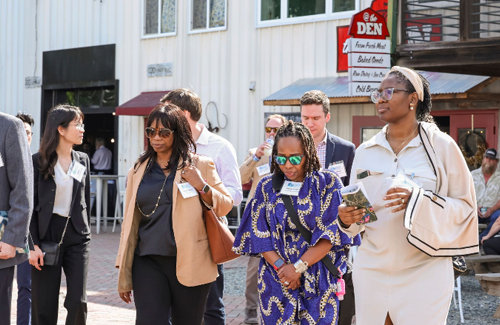
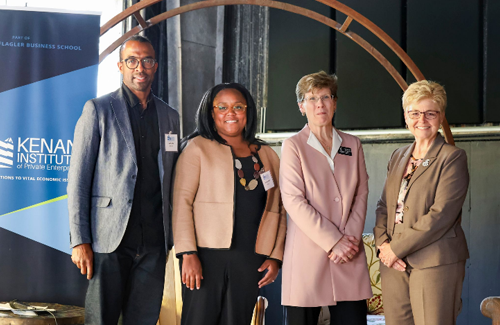
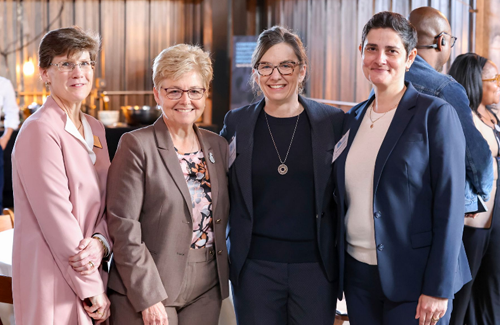

Session III: Who Provides Credit in Distressed Areas?
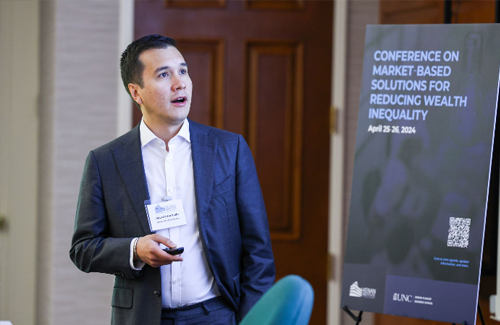
Bright and early, the conference’s third session featured Carlos Parra, Assistant Professor of Finance at Pontificia Universidad Católica de Chile, presenting “The Unintended Consequence of the Community Reinvestment Act Amid the Rise of Shadow Banks,” co-authored with Jacelly Cespedes, Assistant Professor of Finance at University of Minnesota; Erica Jiang, Assistant Professor of Finance and Business Economics at University of Southern California; and Jinyuan Zhang, Assistant Professor of Finance at University of California, Los Angeles. Their study finds that the Community Reinvestment Act (CRA), a major U.S. policy enacted in 1977 intended to enhance geographic equality in credit access, had some counter-productive effects and actually widened disparities across regions, as unregulated shadow banks took the place of regulated bank branches in some disadvantaged areas. The discussant, Daniel Ringo, is a Principal Economist with the Board of Governors of the Federal Reserve System who works with other government officials on CRA reforms, meaning that he is the practitioner that this academic work is intended to reach, and his feedback is extraordinarily valuable to the authors.
Rounding out the session, Samuel Rosen, Assistant Professor of Finance at Temple University, presented “Mission-driven Lenders,” a working paper co-authored with Yaming Gong, a PhD candidate at Temple University’s Fox School of Business, and Tilan Tang, Associate Professor of Finance at Wake Forest University. Their analysis finds evidence that the U.S. government’s Community Development Financial Institution (CDFI) certification program has been successful in expanding credit to counties with largely poor, underserved, and minority populations. The study also suggests that CDFI certification helps lift financial constraints for these lending institutions. Like the previous discussant, the practitioner responding to this presentation, Aurel Hizmo, is a Principal Economist with the Board of Governors of the Federal Reserve System, and his commentary demonstrated the great utility of joining academic and government researchers in thoughtful conversation.
Session IV: Underserved Consumers
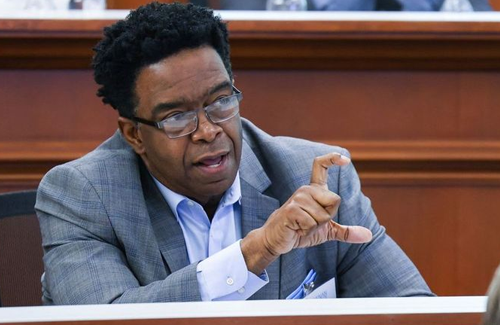
After a short intermission, Jeffrey Weinstein, a Senior Financial Economist at the Federal Deposit Insurance Corporation (FDIC), gave a thorough summary of the 2021 FDIC National Survey of Unbanked and Underbanked Households, which found that the percentage of unbanked Americans has declined for a decade, yet large racial disparities persist, with black and non-white Hispanic Americans representing a disproportionately large share of those without a bank account.
Manju Puri, Professor of Finance at Duke’s Fuqua School of Business, next spoke on her research from India, where smart phones, access to unlimited data, and mobile financial apps have recently become ubiquitous facets of life – a technological revolution that has opened the door for essentially everyone in the world’s largest nation to join the formal banking system and establish credit. Dr. Puri’s work shows how seemingly small infrastructure developments combined with new technologies can help the world’s poor and underserved populations leapfrog traditional, bureaucratic pathways to access credit and other financial instruments.
The session ended with a panel discussion on Financial Inclusion. Moderated by Mat Despard, Vice President of Research and Policy at SaverLife, the conversation featured insights from the banking sector, with Lee Fite, Fifth Third Bank’s Regional President for the Carolina Region, as a panelist alongside Dr. Puri and Dr. Weinstein, both of whom had presented that morning. The dialogue combined various perspectives, showcasing expertise forged through rigorous scientific study, large-scale longitudinal survey, and careers of building relationships and making community investments – a fitting note for the conference to end on.
Dr. Kuhnen wrapped up the proceedings with heartfelt thanks, bringing to a close this year’s Conference on Market-Based Solutions for Reducing Wealth Inequality. Yet participants did not go home empty-handed. Besides bagged lunches, conference participants left with new information from academic research, original ideas for their own work, valuable professional connections, and fresh perspectives on solutions for reducing wealth inequality.